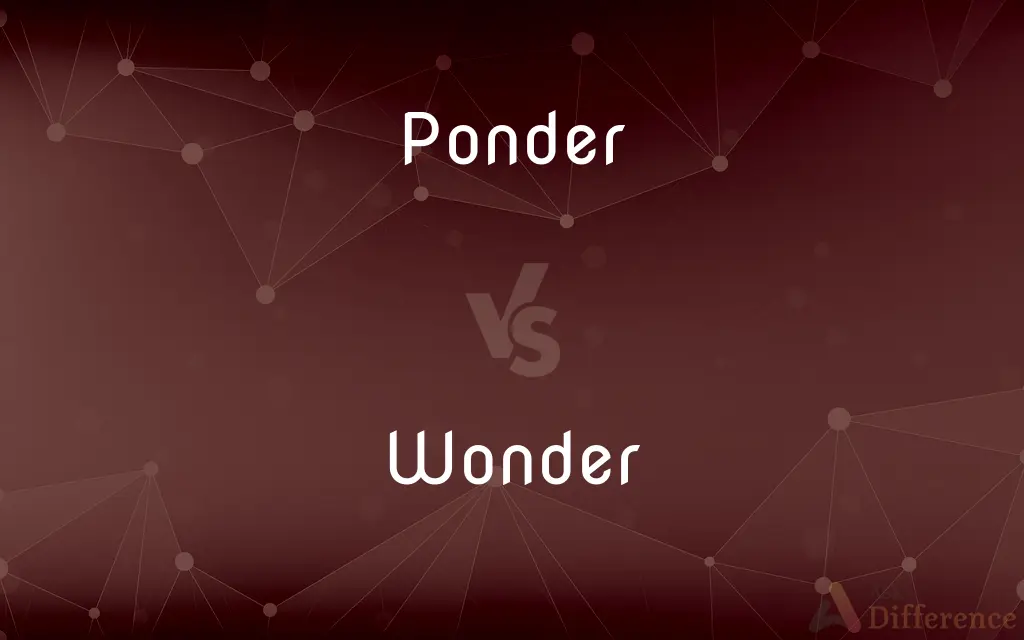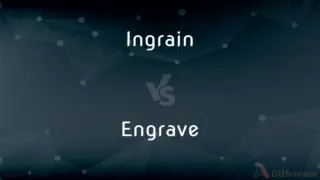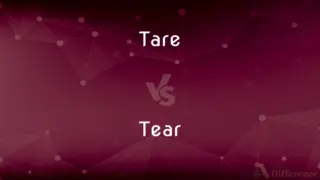Ponder vs. Wonder — What's the Difference?
Edited by Tayyaba Rehman — By Urooj Arif — Updated on March 6, 2024
Pondering involves deep thinking or considering something carefully, while wondering is more about curiosity or questioning without the depth of focused thought.

Difference Between Ponder and Wonder
Table of Contents
ADVERTISEMENT
Key Differences
Pondering is an act of engaging in deep, reflective thought, often about specific issues, problems, or philosophical questions. It implies a deliberate and focused effort to understand or solve something, requiring time and mental engagement. On the other hand, wondering involves a feeling of curiosity or amazement, and it can be more passive and speculative in nature. Wondering might trigger the process of seeking answers, but it doesn’t necessarily involve the same level of analytical thinking as pondering.
They are usually concentrating on a particular subject or question, trying to reach a deeper understanding or come up with a solution. This process can be introspective and methodical, involving analysis and evaluation. Whereas, wondering is more about contemplating possibilities or asking questions about what could be, often driven by a sense of curiosity or desire for knowledge without the immediate need to find concrete answers.
The outcomes of pondering can lead to insights, decisions, or solutions, as it is a process aimed at depth and resolution. In contrast, the act of wondering may not always lead to immediate answers or solutions but can inspire exploration, learning, and further questioning. Wondering can be the starting point that leads one to ponder more deeply on a topic.
Pondering is typically a more solitary and introspective activity, where an individual may spend considerable time in thought. On the other hand, wondering can be a shared experience, often expressed through questions or discussions with others, sparking collective curiosity or amazement.
While both pondering and wondering are important cognitive processes, they serve different purposes. Pondering is crucial for problem-solving and developing a deep understanding, while wondering fuels our curiosity and opens the door to exploration and learning.
ADVERTISEMENT
Comparison Chart
Definition
Deep, reflective thinking on a specific issue.
Curiosity or speculation about possibilities.
Nature
Analytical and focused.
Speculative and questioning.
Outcome
Insights, decisions, or solutions.
Exploration, learning, or further questioning.
Process
Introspective and solitary.
Can be shared or expressed with others.
Purpose
To understand or solve something.
To express curiosity or amazement.
Compare with Definitions
Ponder
Deliberating over a decision with great care.
She pondered her options before choosing her major.
Wonder
Questioning with curiosity about the unknown.
Children wonder why the sky is blue.
Ponder
Thinking carefully about a problem to find a solution.
She pondered the puzzle for hours before solving it.
Wonder
Speculating about possibilities.
They wondered what life might be like on other planets.
Ponder
Meditating on a subject in depth.
The poet pondered the concept of time for his next piece.
Wonder
Being in awe of someone's achievements.
Fans wonder at the athlete's incredible skill.
Ponder
Considering the implications of an action.
The team pondered the consequences of launching the product early.
Wonder
Expressing a desire to know more.
He always wondered about the history of ancient civilizations.
Ponder
Reflecting deeply on philosophical questions.
He spent the evening pondering the nature of happiness.
Wonder
Feeling amazed by something extraordinary.
She wondered at the beauty of the natural world.
Ponder
To think about (something) with thoroughness and care.
Wonder
An extraordinary or remarkable act or achievement
That teacher has worked wonders with these students.
Ponder
To reflect or consider with thoroughness and care.
Wonder
The emotion aroused by something awe-inspiring, astounding, or surprising
Gazed with wonder at the northern lights.
Ponder
To wonder, think of deeply.
Wonder
The quality that arouses such emotion
"Her long fair hair was girlish.
Ponder
To consider (something) carefully and thoroughly.
I have spent days pondering the meaning of life.
Wonder
One that arouses awe, astonishment, surprise, or admiration; a marvel
Given all his unhealthy habits, it's a wonder he's lived this long. She was a wonder in that movie.
Ponder
(obsolete) To weigh.
Wonder
Often Wonder A monumental human creation regarded with awe, especially one of seven monuments of the ancient world that appeared on various lists of late antiquity.
Ponder
(colloquial) A period of deep thought.
I lit my pipe and had a ponder about it, but reached no definite conclusion.
Wonder
An event inexplicable by the laws of nature; a miracle.
Ponder
To weigh.
Wonder
To have a feeling of awe, astonishment, surprise, or admiration
We wondered at the ease with which she settled into her new job.
Ponder
To weigh in the mind; to view with deliberation; to examine carefully; to consider attentively.
Ponder the path of thy feet.
Wonder
To be filled with curiosity or doubt
I could only wonder after hearing his excuse. I wondered about his late-night comings and goings.
Ponder
To think; to deliberate; to muse; - usually followed by on or over.
Wonder
To feel curiosity or be in doubt about
I wondered what kind of costume she would wear. I wondered why I said that.
Ponder
Reflect deeply on a subject;
I mulled over the events of the afternoon
Philosophers have speculated on the question of God for thousands of years
The scientist must stop to observe and start to excogitate
Wonder
Remarkable or extraordinary, especially in being beneficial
Considers quinoa a wonder grain.
Wonder
Something that causes amazement or awe; a marvel.
Wonders of the World seem to come in sevens.
Wonder
Something astonishing and seemingly inexplicable.
The idea was so crazy that it is a wonder that anyone went along with it.
Wonder
Someone very talented at something, a genius.
He's a wonder at cooking.
Wonder
The sense or emotion which can be inspired by something curious or unknown; surprise; astonishment, often with awe or reverence.
Wonder
A mental pondering, a thought.
Wonder
(US) A kind of donut; a cruller.
Wonder
(intransitive) To be affected with surprise or admiration; to be struck with astonishment; to be amazed; to marvel; often followed by at.
Wonder
To ponder; to feel doubt and curiosity; to query in the mind.
He wondered whether penguins could fly. She had wondered this herself sometimes.
Wonder
That emotion which is excited by novelty, or the presentation to the sight or mind of something new, unusual, strange, great, extraordinary, or not well understood; surprise; astonishment; admiration; amazement.
They were filled with wonder and amazement at that which had happened unto him.
Wonder is the effect of novelty upon ignorance.
Wonder
A cause of wonder; that which excites surprise; a strange thing; a prodigy; a miracle.
To try things oft, and never to give over, doth wonders.
I am as a wonder unto many.
Wonder
To be affected with surprise or admiration; to be struck with astonishment; to be amazed; to marvel.
I could not sufficiently wonder at the intrepidity of these diminutive mortals.
We cease to wonder at what we understand.
Wonder
To feel doubt and curiosity; to wait with uncertain expectation; to query in the mind; as, he wondered why they came.
I wonder, in my soul,What you would ask me, that I should deny.
Wonder
Wonderful.
After that he said a wonder thing.
Wonder
Wonderfully.
Wonder
The feeling aroused by something strange and surprising
Wonder
Something that causes feelings of wonder;
The wonders of modern science
Wonder
A state in which you want to learn more about something
Wonder
Have a wish or desire to know something;
He wondered who had built this beautiful church
Wonder
Place in doubt or express doubtful speculation;
I wonder whether this was the right thing to do
She wondered whether it would snow tonight
Wonder
Be amazed at;
We marvelled at the child's linguistic abilities
Common Curiosities
Can pondering lead to solutions?
Yes, pondering is often aimed at reaching insights, making decisions, or finding solutions to problems.
What does it mean to ponder something?
To ponder something means to think about it deeply and carefully, often with the intention to understand or solve it.
How do pondering and wondering contribute to learning?
Pondering aids in understanding complex issues and solving problems, while wondering stimulates curiosity and opens the door to new questions and knowledge.
How is wondering different from pondering?
Wondering is about curiosity or questioning possibilities without the deep, focused thought that characterizes pondering.
Is it common to wonder about things we don’t understand?
Yes, wondering often arises from encounters with the unknown or incomprehensible, driving the desire to learn more.
How can educators encourage students to wonder and ponder?
Educators can encourage curiosity by presenting intriguing questions or problems, fostering an environment where inquiry and deep thinking are valued.
Do you need to express your thoughts when pondering?
Pondering is usually an internal process and doesn’t necessarily need to be expressed, though it can be shared through discussion.
Can wondering lead to scientific discovery?
Many scientific discoveries begin with a sense of wonder about the natural world, leading to questions and research that seek to explain it.
Is wondering always passive?
While wondering can be more passive than pondering, it can actively spark the pursuit of knowledge or lead to deeper inquiry.
Is it beneficial to wonder about the future?
Wondering about the future can inspire hope, drive innovation, and motivate planning for potential scenarios.
Why is it important to ponder life’s big questions?
Pondering life’s big questions can lead to greater self-awareness, understanding of the world, and insights into personal and philosophical matters.
What role does pondering play in creative processes?
In creative processes, pondering helps refine ideas, deepen understanding, and solve creative challenges, leading to more meaningful work.
Are there any tools or techniques to enhance pondering or wondering?
Tools like journals for reflection, brainstorming techniques, or engaging in discussions can enhance both pondering and wondering by organizing thoughts and encouraging exploration.
How do emotions influence pondering and wondering?
Emotions can deeply influence both, driving the intensity of curiosity in wondering and the depth of reflection in pondering.
Can pondering be a form of meditation?
Yes, pondering can be a meditative practice, focusing the mind on a particular thought or question for deeper insight.
Share Your Discovery

Previous Comparison
Ingrain vs. Engrave
Next Comparison
Tare vs. TearAuthor Spotlight
Written by
Urooj ArifUrooj is a skilled content writer at Ask Difference, known for her exceptional ability to simplify complex topics into engaging and informative content. With a passion for research and a flair for clear, concise writing, she consistently delivers articles that resonate with our diverse audience.
Edited by
Tayyaba RehmanTayyaba Rehman is a distinguished writer, currently serving as a primary contributor to askdifference.com. As a researcher in semantics and etymology, Tayyaba's passion for the complexity of languages and their distinctions has found a perfect home on the platform. Tayyaba delves into the intricacies of language, distinguishing between commonly confused words and phrases, thereby providing clarity for readers worldwide.
















































